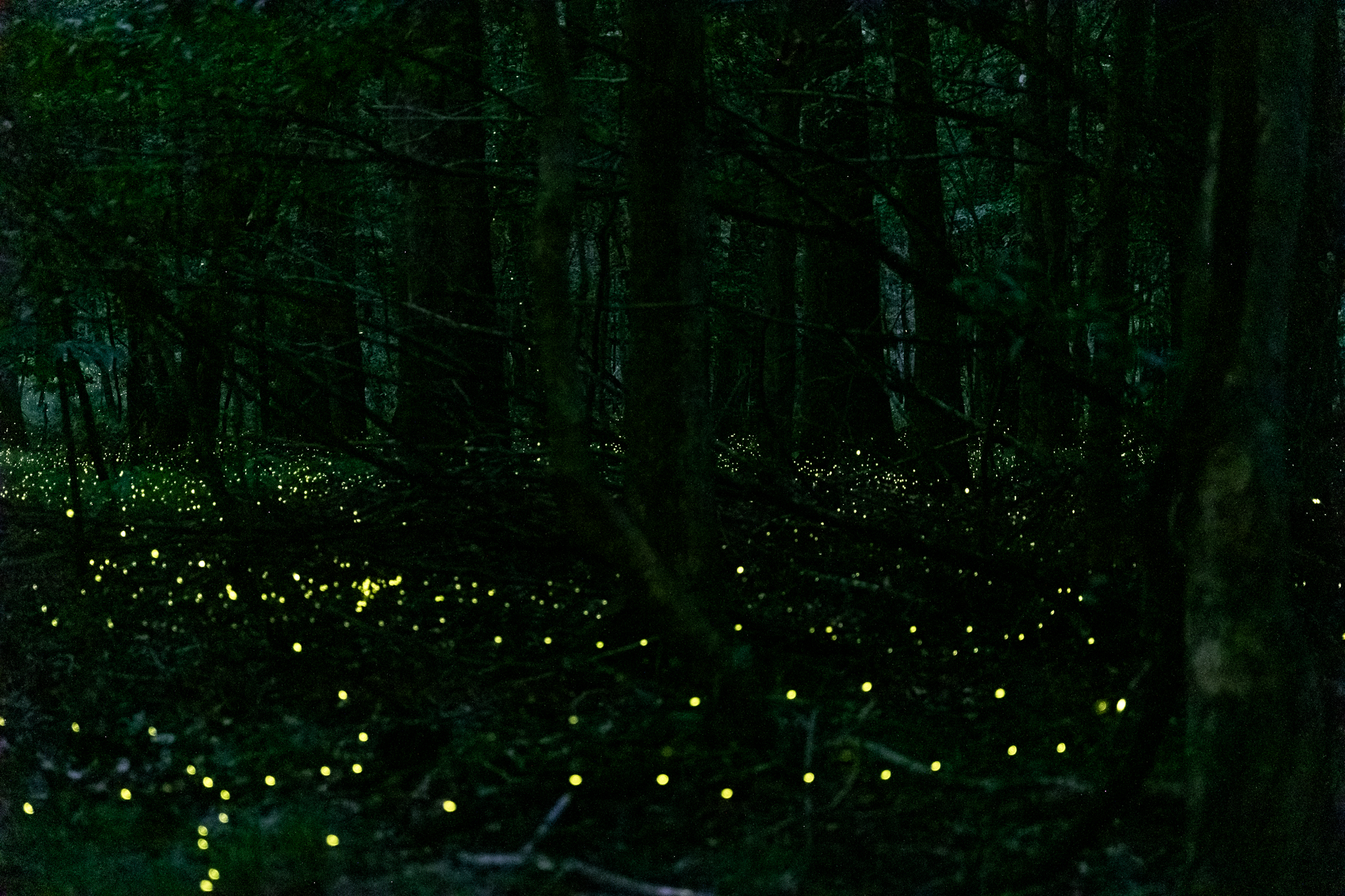alone in the park
alone in the dark
alone in the dark

Congaree National Park, in the middle of South Carolina, doesn’t conform to the typical picture that comes to mind when you think of a national park. It doesn’t have any of the expansive views, rugged terrain or pristine waters that define traditional park imagery. It is a small, flat, muddy swamp perpetually in the shade of a broad canopy. But what it lacks in glamour, it makes up for it with its incredible biodiversity. The reason this parcel of land became protected and ultimately elevated from a National Monument to a National Park is its unique old-growth forest and the many species of reptiles, birds, mammals, and insects that dwell within in abundance, including fireflies.
Snakes, yellow flies, and standing brown water are not considered the most beloved offerings of nature, and indeed Congaree welcomes only about 150,000 visitors per year, compared to the more than 12 millions who swarm the Great Smoky Mountains, one state over. But in recent years, an unusual influx of visitors in late May took the park’s staff by surprise, to the point that special access restrictions had to be put in place. The reason for this unexpected pilgrimage: increased media coverage for the singular display of synchronous fireflies of the Photuris frontalis species. This spectacle was of course the reason for my own visit request.
In May 2020, however, the global pandemic had the extraordinary effect of closing down some parks to the public completely, and Congaree was among them. But the park’s administration, and its Chief Scientist Dr David Shelley in particular, were eager to accommodate enthusiastic researchers, such as myself and my field partner Julie. So much so that, after an initial first contact and a quick tour of the premises, we were given the keys to the park, literally. To be precise, we were given the code to the paddle lock that kept the gate closed, and by gate I mean a modest 20-foot chain attached between two posts. Still, who can boast to have ever been granted exclusive access to no less than a National Park?
Maybe "exclusive" is a bit grandiose. On some evenings, a handful of photographers, journalists, and volunteers also populated the forest, although I’m not sure they had the same unlimited accreditation as ours. Nevertheless, on most nights Julie and I were the only human beings within park boundaries. In my book, that is no small honor.
But being all alone in a National Park, at night, is an intimidating thing, especially at a place like Congaree crawling with life and enveloped in darkness. On top of the spectacular light show that I was enjoying and studying, there was a formidable sound background, made of the very loud chorus of tree frogs and scattered by barn owls hoots and occasional creepy squawks from who-knows-what. And when silence resumes, the atmosphere was even more eerie. What if I were to step on a snaked while crossing the woods in the sparkling night? Could I get lost, swallowed by the obscurity? Was the ranger serious about alligators?
The most unsettling was still to come. As it happens a few times every year, heavy rains on the Smokies had found their way down to the plains and swollen the Congaree River. With merely a few feet of elevation gain over a couple miles, the still water flooded the park almost to the edge of the bluff and our experimental site. As a consequence, the large population of wild hogs, sturdy and nonchalant, had been forced to retreat as well to the edge of the forest, so much so that we found ourselves sharing the leftovers of the dry land. They are usually peaceful individuals, though not the most delicate nor alluring — to human taste. Nonetheless, a close encounter, or worse, a full-blown head-on collision, could have led to a misunderstanding, and in the eventuality of an altercation, I was unsure I would get the upper hand. I had been told they have poor vision, and so do I, hence bringing an accidental encounter winthin the realm of possibility.
It did not happen. Yet, I could often hear their nearby trampling and snorting. My senses on high alert, I would clap my hands and announce a loud "hello". Eventually, I think we simply got used to each other. Both indifferent neighbors, searching for meaning in the darkness of the woods.
Despite their limited sight, I often wondered what they might think of fireflies. Did they see them? Did they chase them? Did they appreciate them?
Big or small, one is never alone in nature.